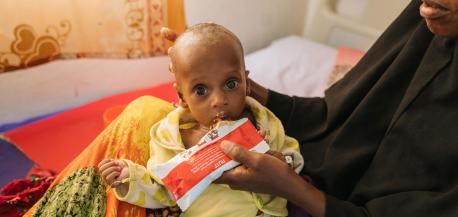
What Is
Child Wasting?
UNICEF and partners like the Eleanor Crook Foundation are working to combat the global nutrition crisis. There's no time to waste.
As the climate change-induced drought crisis in the Horn of Africa deepens, the number of children who don't have enough to eat is rising sharply. By late December 2022, around 20.2 million children across Ethiopia, Kenya and Somalia were facing the threat of severe hunger, thirst and disease. And they are not alone: every minute, the global hunger crisis is pushing another child under 5 into severe malnutrition in the 15 hardest-hit countries.
Without proper nutrition, children cannot grow up healthy and reach their full potential. They are too thin for their height, a condition known as wasting. The most visible and life-threatening form of malnutrition, severe wasting weakens immune systems, leaving children vulnerable to disease, developmental delays and death.
Globally, over 13M children under 5 are impacted by severe wasting
"It's hard to describe what it means for a child to be 'severely wasted,' " said UNICEF Executive Director Catherine Russell. "But when you meet a child who is suffering from this most lethal form of malnutrition, you understand — and you never forget."
Also known as severe acute malnutrition, severe wasting robs children of their health and their future. Severely wasted children are up to 11 times more likely to die of treatable infections and diseases like pneumonia, cholera, malaria and measles than well-nourished children.

UNICEF purchases and distributes 80 percent of the world's RUTF, a lifesaving treatment for severely wasted children
No child should die from malnutrition when the tools exist to prevent it. In 2023, UNICEF plans to treat at least 8 million children suffering from extreme wasting in the 15 most affected countries. Early detection is key to successful outcomes.
Once children are diagnosed, they can be treated with Ready-to-Use Therapeutic Food (RUTF), a shelf-stable, nutrient-rich peanut paste. With a regimen of three packets of RUTF daily, 90 percent of severely wasted children are able to recover fully in roughly six weeks. WIthout it, 90 percent do not survive.
UNICEF purchases and distributes approximately 80 percent of the world's supply of RUTF. In 2022, the U.S. Government committed $200 million to help UNICEF scale up detection, prevention and treatment of severe wasting with RUTF — the single largest investment to combat severe malnutrition in history.
UNICEF provides nutrition support during the critical first 1,000 days of a child's life
To help prevent children from becoming malnourished in the first place, UNICEF works to ensure that pregnant mothers receive the prenatal care they need to deliver healthy babies, then promotes breastfeeding from the first hour of life to give newborns the best start in life.
UNICEF also provides fortified foods and micronutrients to young children during the crucial first 1,000 days, and supports health screenings to detect signs of malnutrition early, so children can be referred for treatment.
UNICEF and partners advocate for increased political will, investment and action to tackle child wasting
Good nutrition is the bedrock of child survival and development. A relatively small additional investment — by donors, governments and other financial instruments — would dramatically reduce child death rates. With partners like the Eleanor Crook Foundation, UNICEF works to strategically engage the public and decision makers to support and invest in child nutrition and end severe wasting by strengthening the systems children rely on.
UNICEF won't stop until every child is healthy and well-nourished, from Afghanistan to Somalia, from the Sahel to Yemen.
Join us in advocating to end this crisis. There is no time to waste. Spread the word.


